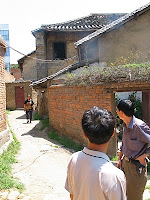Woodrow Wilson, Part One: The Personal Connections
Saturday, January 09, 2010
I am currently reading a Woodrow Wilson biography, my first in perhaps 45 years. Some kind of response will probably follow, but already, as a reader, I bring such a jumble of thoughts to the text that I must clear those out before I can look at the book objectively.
Ever since reading my first Wilson biography, sometime in my early teens, I’ve viewed the 28th presidency as America’s classical Greek tragedy: the Noble Enterprise that fails because of the Great Leader’s one Fatal Flaw. In high school, when an assignment called for a dramatic reading, I performed Wilson’s speech to Congress, calling for war against Germany. Wilson’s life is thinking-man’s theater.
When I personalize history, I am connected to Woodrow Wilson through my great-grandfather, Winfred J. Sanborn.
As far as I know, the two men only met once, and that probably briefly. When Wilson came to Los Angeles on his cross country tour to whip up support for the League of Nations, my great-grandfather sat somewhere behind him on the stage. Later, both my great-grandparents attended a private dinner with the President and the First Lady. By that point in the trip, biographies show an exhausted president, a personal physician deeply worried about Wilson’s health, and yet too many well-wishers outside the hotel room to allow him any rest. The Sanborns could not have warranted much of his time.
In 1919, my great-grandfather (1869 – 1947) was in his first of fourteen years on the Los Angeles City Council. Wilson (1856–1924) was in his sixth year as president. Unbeknown to either, on that Saturday, September 20th, Wilson was only two weeks away from the stroke that would render him an invalid during the remainder of his presidency, paralyzed and blind on the left side. My great-grandfather also suffered a stroke, one year before his death, and three before my birth. My mother recounts sitting by his bedside, watching while he struggled to form words that wouldn’t come. That becomes my image of Wilson’s last year in office.
My great-grandfather, a postman-turned-mortician, entered politics because he envisioned a Los Angeles in which bridges would span the river basin and railroad tracks that separated Boyle Heights from downtown. Too many motorists and pedestrians had lost their lives to one or the other.
Wilson, political science professor turned president of Princeton University, had entered academia with every intention of turning to politics, because he envisioned a whole world of changes. Too many tyrants crushed the hopes of entire empires, and too many people had lost their lives to war. He was not just a nation builder, he was a world builder.
Both Wilson and my great-grandfather were active in Presbyterian leadership before turning to civil government. When the national Presbyterian conference split over the Civil War, Wilson’s father led in organizing its Southern branch. Woodrow chose the classroom over the pulpit, but led as a layman. When modernist professors pressed Princeton for liberalization, Wilson held the line against them. In 1905, when the Northern branch (Presbyterian Church in the USA) held its General Assembly in Los Angeles, Winfred Sanborn served on the entertainment committee. By 1920 and 1922, he was serving as a delegate to the General Assemblies held in Philadelphia and Des Moines. Those conferences also faced modernist/fundamentalist struggles. I’ve always wondered where my great-grandfather stood.
As largely a faith-based voter, I pay careful attention to what a politician believes. Last year I reviewed Stephen Mansfield’s The Faith of Barack Obama. The biography I’m reading now is Malcolm D. Magee’s What the World Should Be: Woodrow Wilson and the Crafting of a Faith-based Foreign Policy. The book largely ignores the domestic scene, where Wilson enjoyed great success (I’ve seen Wilson credited with enacting all of his own domestic policy, with time to go back and enact the campaign promises made by his 1912 opponents, William H. Taft and Theodore Roosevelt). It is overseas that Wilson is remembered for winning the war and losing the peace.
I am only about 40 pages into the book, and I am reading slowly, pondering as I go. I wish I could read it together with my great-grandfather. When I finish the book, I’m sure I will have some thoughts to share. But for now, I just needed to clear my mind of these prerequisites. Thank you for indulging me.




